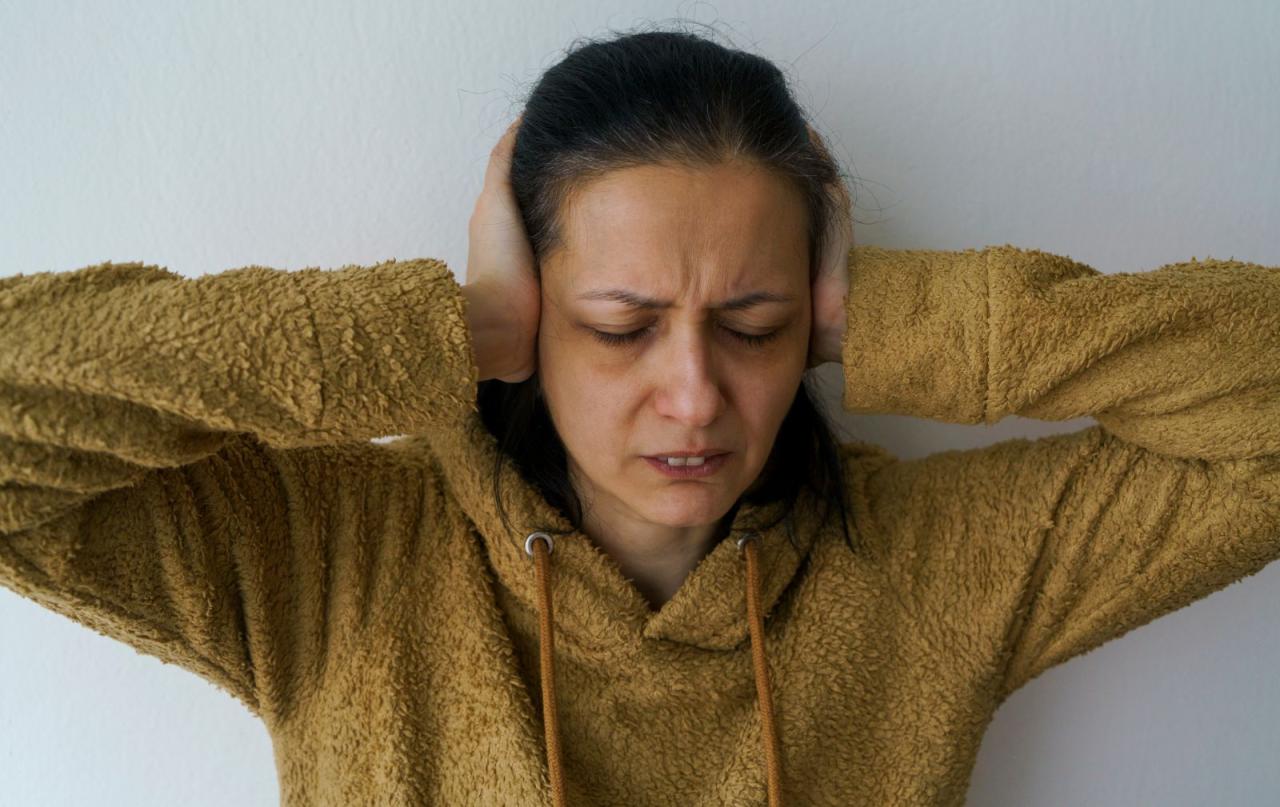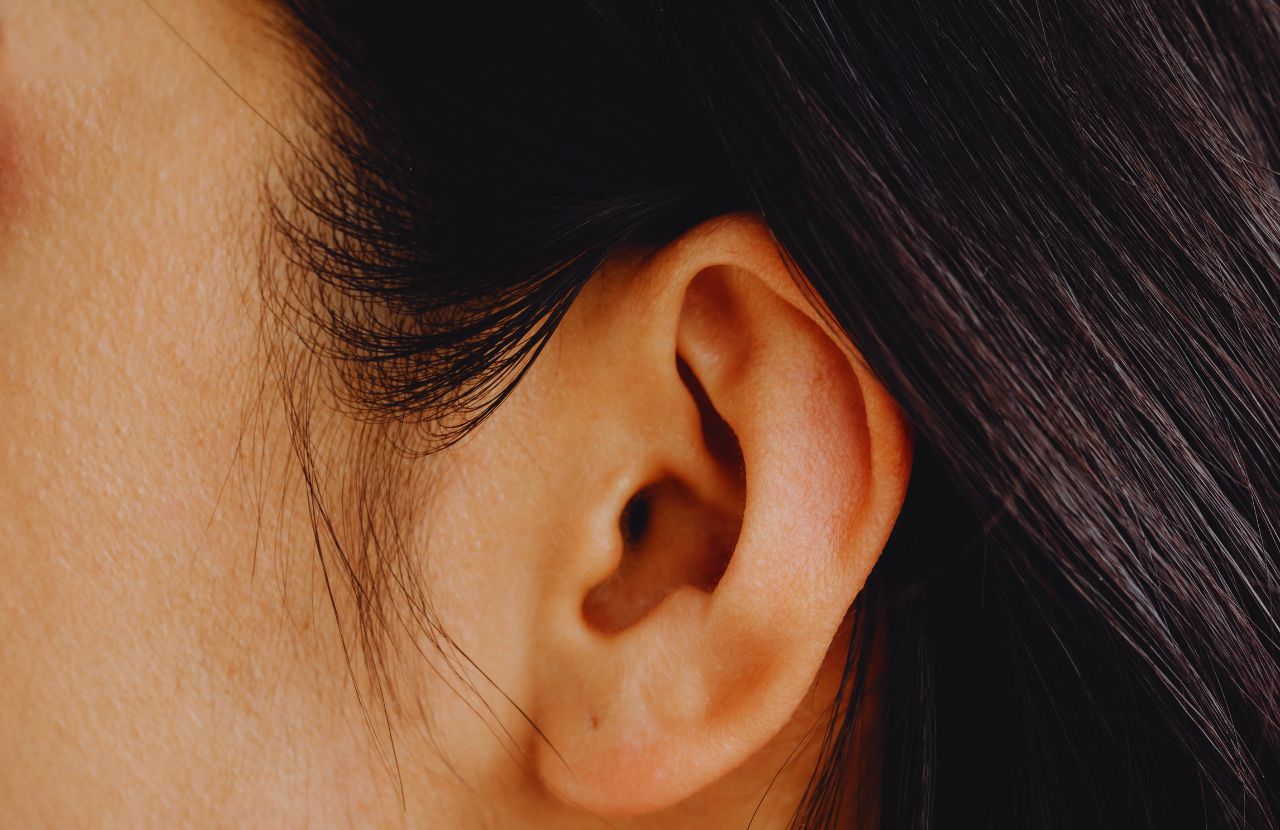Fluttering in ear when lying down – Flutter in ear when lying down is a common symptom that can be caused by various underlying conditions. Understanding the causes and treatment options can help alleviate discomfort and prevent further complications.
This article provides an in-depth overview of fluttering in the ear when lying down, covering its causes, diagnosis, treatment options, home remedies, and preventive measures. By exploring these aspects, we aim to empower individuals with the knowledge to effectively manage this condition.
Causes of fluttering in ear when lying down

Fluttering in the ear when lying down can be caused by various factors, including:
Eustachian tube dysfunction
The Eustachian tube is a small channel that connects the middle ear to the back of the throat. When you swallow or yawn, the Eustachian tube opens to equalize pressure in the middle ear. If the Eustachian tube is blocked or not functioning properly, it can cause a fluttering sensation in the ear when you lie down.
Fluid buildup
Fluid can build up in the middle ear due to allergies, colds, or other infections. This fluid can cause pressure and fluttering in the ear, especially when you lie down.
Muscle spasms
The muscles in the middle ear can spasm, which can also cause a fluttering sensation. Muscle spasms can be caused by stress, fatigue, or certain medical conditions.
Diagnosis of fluttering in ear when lying down
Diagnosing the cause of fluttering in the ear when lying down involves a series of examinations and tests. These procedures aim to rule out other potential causes and confirm the underlying cause of the fluttering, enabling appropriate treatment.
Physical examination
The doctor will perform a physical examination of the ear, including the outer ear, ear canal, and eardrum. They will look for any signs of infection, inflammation, or other abnormalities that may be causing the fluttering.
Otoscopy
Otoscopy is a procedure that uses a lighted instrument called an otoscope to examine the ear canal and eardrum. This allows the doctor to visualize the structures of the ear and check for any abnormalities, such as wax buildup, fluid, or damage to the eardrum.
Audiometry
Audiometry is a test that measures hearing ability. It involves listening to sounds at different frequencies and volumes to determine the range of sounds that can be heard. This test can help rule out hearing loss or other auditory disorders that may be contributing to the fluttering in the ear.
Importance of accurate diagnosis
Accurate diagnosis is crucial for appropriate treatment of fluttering in the ear when lying down. By identifying the underlying cause, the doctor can recommend the most effective treatment plan, which may include medications, earwax removal, or other interventions.
Treatment options for fluttering in ear when lying down
Fluttering in the ear when lying down can be a distressing symptom, but fortunately, there are several treatment options available. The best course of treatment will depend on the underlying cause and severity of the condition.
In some cases, simple measures such as avoiding caffeine and alcohol before bed, or using a white noise machine to block out other sounds, can be effective in reducing fluttering in the ear. For more severe cases, medications or surgical procedures may be necessary.
Medications
Medications that can be used to treat fluttering in the ear include:
- Antihistamines: These medications can help to reduce inflammation and swelling in the ear canal, which can help to relieve fluttering.
- Decongestants: These medications can help to open up the Eustachian tubes, which can help to equalize pressure in the ear and reduce fluttering.
- Antibiotics: These medications may be prescribed if there is an infection in the ear.
Ear drops, Fluttering in ear when lying down
Ear drops can also be used to treat fluttering in the ear. Some common types of ear drops include:
- Antibiotic ear drops: These ear drops can help to treat infections in the ear.
- Corticosteroid ear drops: These ear drops can help to reduce inflammation and swelling in the ear canal.
- Saline ear drops: These ear drops can help to flush out debris from the ear canal and reduce fluttering.
Surgical procedures
In some cases, surgical procedures may be necessary to treat fluttering in the ear. These procedures may include:
- Tympanoplasty: This procedure involves repairing a hole in the eardrum.
- Mastoidectomy: This procedure involves removing infected or damaged bone from the mastoid bone behind the ear.
Home remedies for fluttering in ear when lying down

Fluttering in the ear when lying down can be an annoying and uncomfortable symptom. Fortunately, there are several effective home remedies that can help alleviate the discomfort and symptoms associated with this condition.
One simple and effective home remedy is to apply a warm compress to the affected ear. The warmth can help to relax the muscles around the ear and reduce inflammation. To make a warm compress, simply soak a washcloth in warm water and apply it to the ear for 10-15 minutes at a time.
Repeat this process several times a day until the symptoms subside.
Another effective home remedy is to take over-the-counter pain relievers, such as ibuprofen or acetaminophen. These medications can help to reduce inflammation and pain. Be sure to follow the directions on the package carefully and do not take more than the recommended dosage.
Steam inhalation can also be helpful in relieving the symptoms of fluttering in the ear. The steam can help to thin mucus and promote drainage, which can reduce pressure in the ear and alleviate discomfort. To perform steam inhalation, simply boil a pot of water and place it on a table or counter.
Cover your head with a towel and inhale the steam for 10-15 minutes at a time. Repeat this process several times a day until the symptoms subside.
It is important to note that home remedies may not be effective for everyone and may not be appropriate for all cases of fluttering in the ear. If the symptoms are severe or do not improve with home treatment, it is important to seek professional medical attention.
Prevention of fluttering in ear when lying down

Prevention is crucial in reducing the risk of developing fluttering in the ear when lying down. Certain lifestyle modifications and preventive measures can help protect the ears and prevent underlying conditions that may contribute to this condition.
Noise Avoidance
Excessive exposure to loud noises can damage the delicate structures of the inner ear, increasing the likelihood of fluttering sensations. Using earplugs or noise-canceling headphones in noisy environments can help minimize the impact of loud sounds on the ears.
Maintaining Good Posture
Poor posture, such as slouching or tilting the head to one side for extended periods, can strain the muscles and structures around the ears. Maintaining good posture, with the head held upright and shoulders relaxed, can help reduce pressure on the ears and prevent fluttering.
Stress Management
Stress can trigger muscle tension and spasms, which can affect the muscles around the ears. Engaging in stress-reducing activities, such as yoga, meditation, or deep breathing exercises, can help manage stress and reduce the risk of fluttering in the ear.
Regular Ear Check-Ups and Cleaning
Regular ear check-ups with a healthcare professional can help identify and address any underlying ear conditions that may contribute to fluttering. Professional ear cleaning can remove excess earwax and debris, which can block the ear canal and lead to fluttering sensations.
Concluding Remarks
Flutter in ear when lying down can be a bothersome symptom, but it is often manageable with appropriate treatment and lifestyle modifications. Understanding the underlying causes and implementing effective remedies can significantly improve ear health and overall well-being.
FAQ Guide: Fluttering In Ear When Lying Down
What are the common causes of fluttering in ear when lying down?
Fluttering in ear when lying down can be caused by Eustachian tube dysfunction, fluid buildup in the middle ear, and muscle spasms in the middle ear.
How is fluttering in ear when lying down diagnosed?
Diagnosis involves physical examination, otoscopy, and audiometry to determine the underlying cause.
What are the treatment options for fluttering in ear when lying down?
Treatment options include medications, ear drops, and surgical procedures, depending on the underlying cause and severity of the condition.






